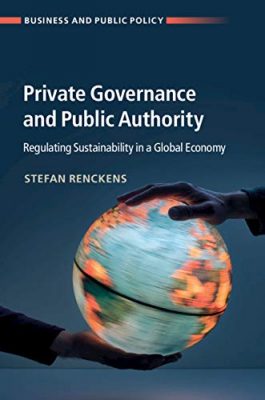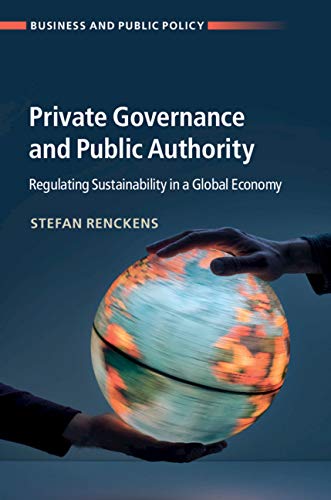 Author: Stefan Renckens
Author: Stefan Renckens
Publisher: Cambridge University Press – 314 pages
Book Review by: Sonu Chandiram
This book published in 2020 is part of the Business and Public Policy series of Cambridge University Press. This series aims to play a pioneering role in shaping this emerging field of business and public policy. It focuses on two central questions:
First, how does public policy influence business strategy, operations, organization, and governance, and with what consequences for both business and society?
Second, how do businesses themselves influence policy institutions, policy processes, and other policy actors, and with what consequences?
Cooperation between governments and the business sectors has often shown to have beneficial effects for both sides and for any given country and its population as a whole. But sometimes, such cooperation does not redound to the benefit of both entities. This book is about such relationships among members of the European Union.
The author Stefan Renckens shows mixed outcomes of such cooperation in 12 Tables listed in this book. He states in his Introduction:
“Ensuring the sustainability of global production processes and supply chains is an increasing concern in many sectors. The production of agricultural commodities such as sugar, coffee, or soy for example, has been associated with adverse environmental and social impacts, including land degradation, deforestation and labor exploitation(High Level Panel of Experts, 2013: UNDP, 2016).”
Renckens points out that these agricultural products travel thousands of miles from countries outside Europe, crossing multiple borders. The coffee, soy, sugar, tea and other farm-based products then end up in the hands of European consumers, most of whom do not know which countries they came from, including whether the exporters complied with global production processes.
He writes that a combination of ‘feeble law enforcement’, ‘ineffective domestic institutions’, ‘weak regulations’ disregard of environmental dangers and other shortcomings both in exporting countries as well as in recipient destinations, including violations of multilateral trade agreements, create chaotic situations for Members of the European Union.
In this book, Renckens lays out details of the problems mentioned above, plus a host of others, and suggests ways whereby business and public entities can work cooperatively for the benefit of all concerned. In a succinct outline covering seven critical areas, he discusses the problems at hand:
viii. List of Figures
- List of Tables
- Acknowledgments
xii. List of Abbreviations
- Introduction: Public-Private Governance Interactions
- Explaining Public Interventions in Private Governance
- Organic Agriculture
- Biofuels
- Fair Trade
- Fisheries
- Evaluating Public Interventions
Appendix: Interviews
Endnotes
References
In the last chapter, Renckens suggests five solutions in the section Going Forward that we quote below, to the problems discussed in this book
- “Further research should examine how the interactions between public support for product differentiation and reclaiming public authority play out, and which of the factors potentially carries a heavier weight in the causal explanation.”
- “Second, the flipside of a focus on public authorities explicitly trying to reclaim authority is questioning the possibility of interventions in the first place.”
- “A third avenue for further inquiry concerns interest representation by private governance schemes.”
- “Fourth, the findings of this book offer useful starting points for new research on policy diffusion.”
- “Finally, the findings of this book about the rather limited impact of the EU’s regulatory interventions on the governing authority of private schemes will likely fail to alleviate the fears of critics who oppose private governance as a useful instrument, as discussed in the introductory chapter.”
All in all, this is a well-researched book that not only provides evidentiary support for Professor Stefan Renckens’ findings and assertions, but also well-modulated solutions on a sensible path forward for a well-balanced, cooperative relationship between business entities and public authorities for the ultimate benefit of all parties affected and concerned.
Author:
Stefan Renckens is Assistant Professor in the Political Science Department of the University of Toronto. His research examines the political economy of transnational private sustainable governance and public-private governance interactions.
He holds a PhD in Global Environmental Politics from Yale University. His PhD dissertation received the American Political Science Association’s Best Dissertation Award in Science, Technology and Environmental Politics (2015). He also holds master’s degrees in political science, economic policy, and conflict and peace studies. He has received research grants from the Canadian Social Science Foundation, and the Research Foundation Flanders.







